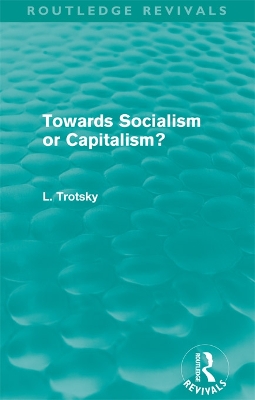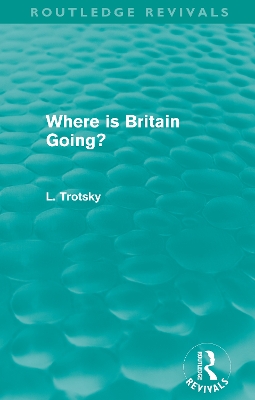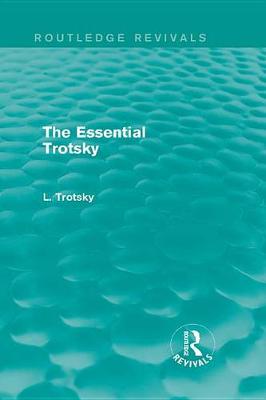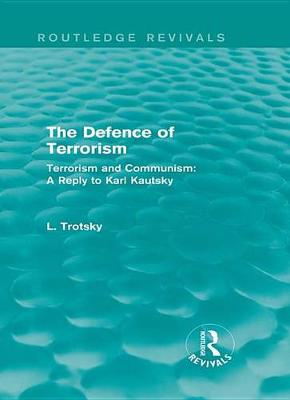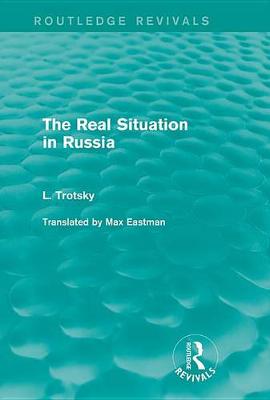Routledge Revivals
5 total works
First Published in 1926, Towards Socialism or Capitalism? considers how the socialised economy of Soviet Russia, isolated in a capitalist world after Lenin's death, faced acute dangers. Trotsky and the Left Opposition alone fought the Stalinist degeneration of the state and party apparatus which threatened to open the door to capitalist restoration. The three articles in this book, written between 1925 and 1932, discuss the fundamental problems of the Soviet economy from the New Economic Policy to forced collectivization. Published here in one volume, they are indispensable steps in the development of Trotsky's analysis of the Soviet Union, laid down in 1936 in 'The Revolution Betrayed'.
First Published in 1926, Where is Britain Going? focuses on the historical factors and circumstances which were to define Britain's development in the midst of social unrest at that time. The book considers the future of Britain in an age when the working classes were being driven into confrontation with the state under the impact of the world crisis of capitalism. Writing over eighty years ago, Trotsky concentrates on the decline of British imperialism in his analysis of the Bolshevik Revolution. In a brilliant polemic that exposes all the treachery of the Labour leaders in the year before the General strike, he recalls the revolutionary traditions of the working class and draws on the historical lessons of the English Civil War and Chartism. Rejecting the parliamentary road and stripping bare the pretensions of Fabian socialism, Where is Britain going? outlines perspectives of revolution which continue to retain their validity.
When Lenin died and the Russian Revolution began to devour its leaders, Trotsky survived longer than most as an exile in Mexico, until his assassination in 1940. The Essential Trotsky, first published in 1963, demonstrates the significance of this innovative and radical thinker’s contribution to the Bolshevik success, the magnetism of his personality, and also a certain tragic heroism discernible throughout his life.
The History of the Russian Revolution to Brest-Litovsk was written immediately after the events it describes, when Trotsky was attending the negotiations that extracted Russia from the First World War; The Lessons of October, an answer to his opponents in 1924, matches Lenin in power of analysis; and Stalin Falsifies History, written in 1927, presents the beginning of the distorting process by which Stalin secured his position, and defeated a range of attitudes, many more benign than his own, towards the future of the Revolution. This is a fascinating reissue that will be of value to students with an interest in early-twentieth century Russia, the Russian Revolution and the writings of Trotsky more generally.
The Defence of Terrorism, originally written in 1920 on a military train during the Russian Civil War, represents one of Trotsky's most wide-ranging and original contributions to the debates that dominated the 1920s and '30s.
Trotsky's intention is "far away from any thought of defending terrorism in general". Rather, he seeks to promote an historical justification for the Revolution, by demonstrating that history has set up the 'revolutionary violence of the progressive class' against the 'conservative violence of the outworn classes'. The argument is developed in response to the influential Marxist intellectual Karl Kautsky, who refuted Trotsky's 'militarisation of labour' and Lenin's wholesale rejection of a 'bloodless revolution'. The introduction, written for the second edition of 1935, presents Trotsky's reflections on the similarities between Kautsky and the burgeoning British Labour Party: specifically, it recapitulates Trotsky's belief that revolution conducted according to the norms of Parliamentarianism is no revolution at all.
The Real Situation in Russia, first published in 1928, contains three of Trotsky’s harshest rebuttals of Stalin’s takeover of the Russian Revolution following the death of Lenin. The first part contains a defence of the ‘Opposition Platform’ against the Stalinist denunciation; the second details Trotsky’s view of the precise nature of the Stalinist program, as well as its disastrous consequences for Russia; and the third demonstrates the unashamed falsification of the history by Stalin with regard to the beginning of the Revolution.
Including a sympathetic, but nonetheless astute, introduction to Trotsky’s argument by the translator, The Real Situation in Russia will prove to be of value to all students of twentieth-century Marxism, and in particular to those interested in the Russian Revolution – not only its origins and early development, but also, perhaps, the reasons for its ultimate failure.
